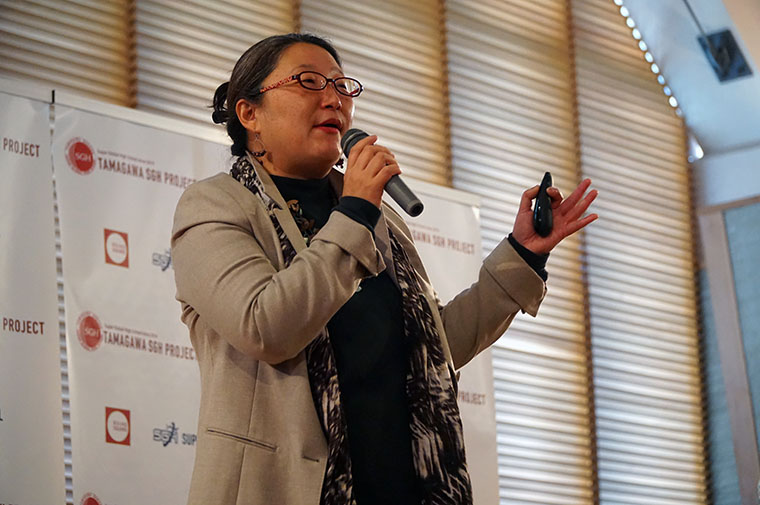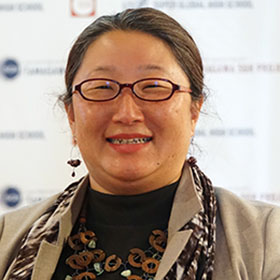Approximately 300 students from 11th and 12th grade participated in the Global Career lecture this time and it was held in the school chapel.

Ms. Hiroko Hirahama, manager of the UN Sudan Mission (UNMISS) Benthi Office, was the day’s lecturer.
She talked about her activities in the UNMISS, her work, and the “Connection with people” she valued there.

“I did not plan this career path.” Ms. Hirahara’s story started with her friendly Kansai accent notable.
I started thinking about work when I was a high school student. I thought, “I want to do a job to help people who are in trouble overseas,” it was from such a vague idea. I only became aware of the realities of “working at an international organization” when I studied in the U.S. during my senior year in high school and at the University of Michigan, seeing the world with a broader perspective

Ms. Hirahara talked about what is necessary to work in international organizations. She successfully passed the JPO exam which was a goal of hers. After that she built up her experience by working and useing what she learned at university and her linguistic abilities. Since 2001 she has worked extensively with the United Nations Environment Program’s Basel Convention Secretariat in Geneva and UNICEF Headquarters in New York.

However, in those workplaces, Ms. Hirahara’s wish of working on actual sites did not come true.
She pushed on making her desires know and eventually she was able to participate in the United Nations PKO, and she was able to get to work on the front lines at last.
After three years had passed since she took office as the Representative of the East Republic of the Republic of southern Sudan, her boss told her, “Because you gained experience in a place with less conflict, could you take that experience and put it to use in a place with more difficult conditions?”.
Although she was afraid of the change, she decided, “I have to do it!”, and in February 2016, she began working as a director in Benthi, the capital of the Unity state with a population of around 600,000.

Unity State, which has been subjected to major conflicts, is a dangerous area where the civil war re-started in July 2016 over the wealth from the nearby oil fields. With 100,000 out of the Bentuu people forced to live in refugee camps.
The students looked at photographs on the screen, showing the strange sight of armed soldiers watching hospitals and camps after a battle.

Then, along with photographs showing the improvement in people’s lives from the PKO’s activities, she explained the activities of the UNMISS. Things such as escorting humanitarian operations, police activities in protected areas, and human rights monitoring are all part of their mandate.

One of the important things the UNMISS has to do is negotiations with various groups. One week before this lecture, Ms. Hirahara himself served as UNMISS Benthi ‘s office manager, and went to negotiate a ceasefire between the government army and the leader of the rebel army.
Preparing herself with the knowledge that “If you think you are afraid, you can not negotiate”, she headed to meet the rebel army without wearing a bulletproof vest and having an escort. She did not know when she might be shot, and the audience was overwhelmed by the courage she showed.

“Because I am an outsider, they would not listen to me. But I contacted the ambassadors of the United States and Britain and was able to build good relationships a lot of the involved people. From that I could make the negotiations possible. My message then was “Please do not start a war”.
The power of this statement was transmitted by the fact that students realized that the power of human relationships and emotions could prevent war in conflict situations. The students actually stopped taking notes and listened more intently to her stories.


After a student asked, “What is necessary for a mutual understanding between people from different cultures and values?” She replied immediately, “About 90% of my work is building human relationships, it is hard but sometimes you will see unexpected results later if you build good and solid relationships. The important thing is “people”. In order to make something move, we need good human relations as the base. “


In this lecture, the students learned a lot more about “human relations” which they could understand as a concrete method to solve international problems and that it is an indispensable force for future global society.




